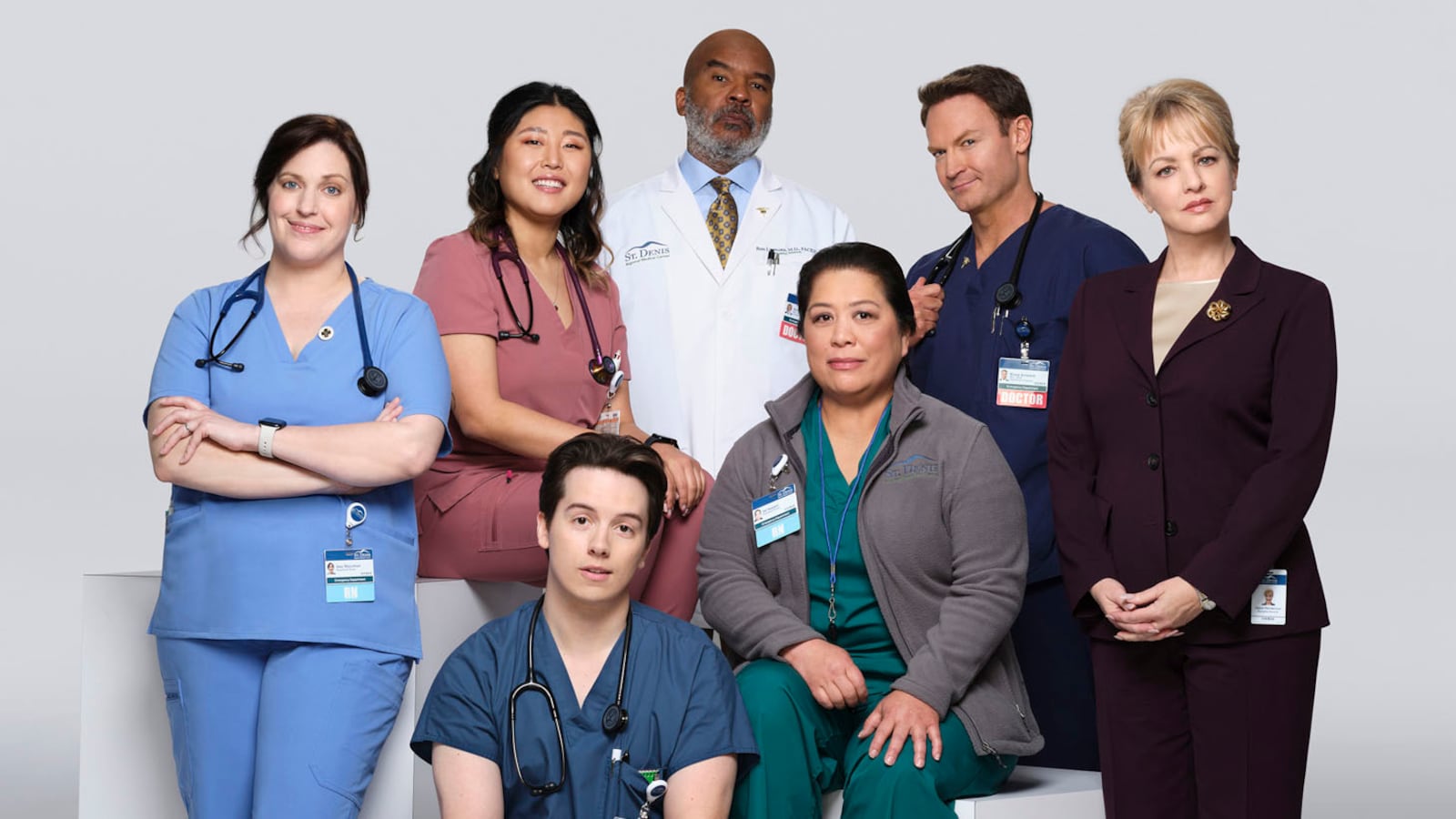It took the U.S. version of The Office about five seasons to complete its full, multi-phase journey from awkwardly derivative cringe comedy to richly populated ensemble to cuddly comfort watch. Parks and Recreation made the trip at a quicker pace, reaching its final form around Season 4. Until late-period doldrums dampened both shows, that evolution proved advantageous, giving the characters a greater sense of surprise and emotional range than initially appeared just by virtue of their creators figuring them out on the fly.
So it’s not always for the best when shows bearing the obvious influence of these workplace mockumentaries must attempt to arrive fully formed, in an era of shorter season orders. Compressing that longer arc can produce something more efficient but less entertaining: a nakedly derivative sitcom that’s also wholly convinced of its own goodhearted lovability. That’s the diagnosis for St. Denis Medical, a hospital comedy that’s like The Office, Parks and Recreation, Brooklyn Nine-Nine, and Scrubs pureed into a flavorless mush.
In theory, St. Denis Medical, which premieres Nov. 12, should be difficult to dislike. Co-creator Justin Spitzer has been keeping the faith for the mostly lost art of the single-camera NBC comedy, having created Superstore and the shorter-lived American Auto; he even wrote an episode of Scrubs back in the day, though it’s hard to determine whether this should afford him more or less leeway for knocking it off here. Finally, a Scrubs where characters constantly do deadpan takes to the camera!
St. Denis Medical is mostly about nurses, not med students, but it has similar aspirations to illustrate the comic, quotidian middle ground of hospital work in addition to the spirit-lifting highs and soul-crushing lows. Alex (Allison Tolman) is the hard-working, recently promoted, and still underpaid supervising nurse at the ER of a relatively modest Oregon hospital; her boss Joyce (Wendi McLendon-Covey) is the more outrageous hospital director with designs on transforming the facility into the envy of the state.

Immediately, the balance between the show’s top-billed performers flies out of alignment. Though the premiere episode is quick to characterize Alex as a control freak with an above-and-beyond sense of dedication not unlike Leslie Knope, Tolman comes across so level-headed, reasonable, and empathetic that she fails to garner more than a handful of polite chuckles. (She’s nice and good at her job! Hilarious!) McLendon-Covey, meanwhile, goes far broader, but if she’s supposed to form a straight-and-wild duo with her co-star, it doesn’t quite gel. True to the show’s speed-run of The Office and Parks and Rec, it’s like watching a sedate version of Amy Poehler’s Knope opposite an amalgam of The Office’s late-season Steve Carell replacements.
St. Denis does have a few promising characters in the mix: Matt (Jury Duty‘s Mekki Leeper), a newly hired nurse with a sheltered, religious background; Serena (Kahyun Kim), a young but experienced nurse with a mischievous streak; and the different shades of arrogance displayed by hot-shot trauma surgeon Bruce (Josh Lawson) and veteran physician Ron (David Alan Grier). Some of the hospital issues they touch upon across the half-dozen episodes screened for press have snips of comic bite, like Matt’s frustrated attempts at eliciting a thank-you from a man whose life he helps save, or the nurses’ ongoing resentment of a doctor workload they see as comparably light. From a distance, this could pass for one of NBC’s Thursday-night comedies circa 2009.
Actually sitting down to watch St. Denis Medical, however—paying it genuine attention—does the show no favors. Alert viewers will be able to predict countless middling punchlines, right down to the timing of those endless looks to the camera. (A documentary crew following these characters around makes a little more sense than on other sitcoms that nick the Office format for no real reason, but it’s still a shockingly tired conceit.)

This is ultimately a show that prioritizes likability and “heart” to such a degree that it develops unintentionally smarmy undertones as it showcases its own decency and correctness. A good comedy doesn’t need to be mean or even edgy to succeed, but a respectful tribute to an undervalued profession isn’t inherently fertile comic ground, at least not without a more idiosyncratic point of view. If St. Denis Medical catches on enough to survive for multiple seasons, maybe that can be its own, next-gen arc: moving on from the many shows it resembles, into a comedy with its own style and personality.








